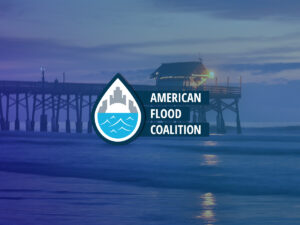American Flood Coalition Recognizes Congresswoman Lizzie Fletcher as a Federal Champion
As increased rain events impact the greater Houston region, Congresswoman Fletcher has a proven commitment to improving disaster recovery process and flood mitigation
FOR IMMEDIATE RELEASE: January 9, 2020
WASHINGTON, D.C. — The American Flood Coalition today announced that Congresswoman Lizzie Fletcher (D-Texas) has been recognized as a Federal Champion and has joined the nonpartisan alliance aimed at finding proactive solutions to the challenges posed by flooding and sea level rise.
“I am proud to join the American Flood Coalition and honored to be named a Federal Champion,” said Congresswoman Fletcher. “Bringing attention to the need for real solutions for a more resilient future is critical, is nonpartisan, and is most effective with this diverse coalition of communities and stakeholders.”
Since taking office, Congresswoman Fletcher has worked to promote more effective disaster response and flood mitigation strategies. Her first original bill, co-sponsored by Congressman G.K. Butterfield, Congressman Mark Meadows, and Congressman Pete Olson, the Hazard Eligibility and Local Projects (HELP) Act, passed the House with overwhelming bipartisan support in December 2019. The bill will improve disaster mitigation efforts by eliminating red tape and enabling certain disaster recovery projects to proceed more quickly.
Congresswoman Fletcher also led a bipartisan effort this year to ensure the release of disaster recovery funds. Her effort, which was signed into law in the Supplemental Appropriations Act, ensures that mitigation funds reach impacted communities without unnecessary delays. Fletcher also chaired a field hearing in her district on hurricane science that addressed innovative ways Congress can work with research institutions and the private sector to improve resiliency efforts across the country.
In 2017, Hurricane Harvey brought nearly 60 inches of rain and left $125 billion in damages in its wake, damaging thousands of homes throughout the greater Houston area. In the Bellaire and Meyerland areas, previously flooded in the Memorial Day and Tax Day floods, some families saw water in their homes for the second or third time. In West Houston, the record rainfall left thousands with water in their homes, many for several weeks. In 2019, Tropical Storm Imelda dropped as much as 43 inches of rain on some parts of southeast Texas in just 72 hours, forcing the evacuation of between 1,200 and 1,500 Harris County residents from their homes.
“Devastation from massive rain events has become more common as increased flooding continues to hit the Houston area,” said Melissa Roberts, Executive Director of the American Flood Coalition. “We’re excited to see Congresswoman Fletcher’s leadership on these crucial issues as a newly elected official. We look forward to working with her to advance innovative solutions to address flooding in Greater Houston and across the nation.”
Congresswoman Fletcher is the 20th Federal Champion to commit to finding national solutions to flooding and sea level rise by joining the American Flood Coalition. The Coalition has over 190 members across 14 states, including two Federal Champions in Texas: Congresswoman Fletcher (TX-7) and Congressman Dan Crenshaw (TX-2).
The American Flood Coalition is a nonpartisan group of cities, elected officials, military leaders, businesses, and civic groups that have come together to drive adaptation to the reality of higher seas, stronger storms, and more frequent flooding through national solutions that support flood-affected communities and protect our nation’s residents, economy, and military installations.
Cities, towns, elected officials, businesses, and local leaders wishing to join the American Flood Coalition or read more about the organization’s work can visit the Coalition’s website (www.floodcoalition.org) to find out more.



